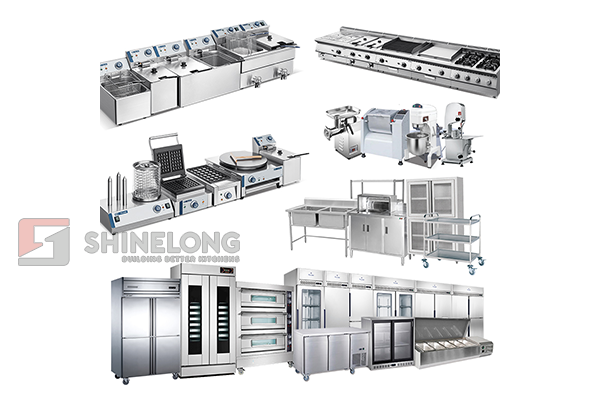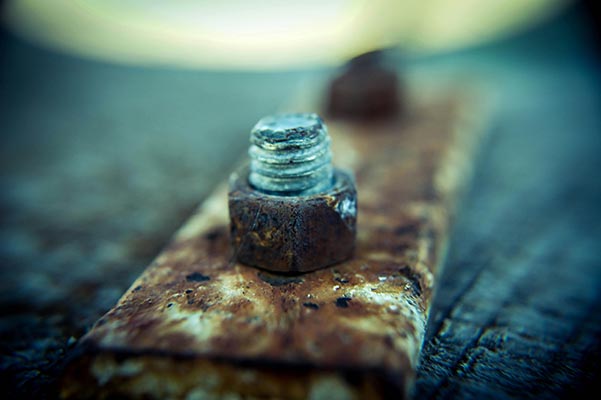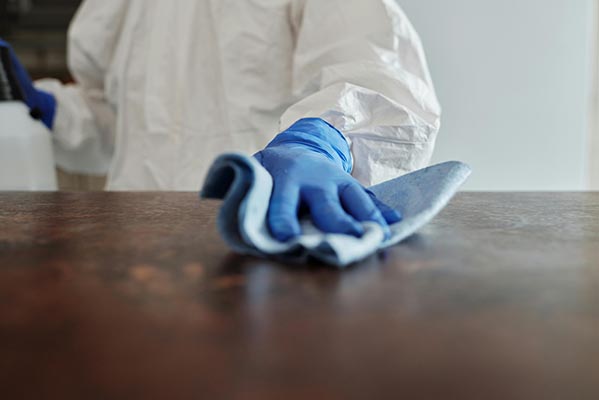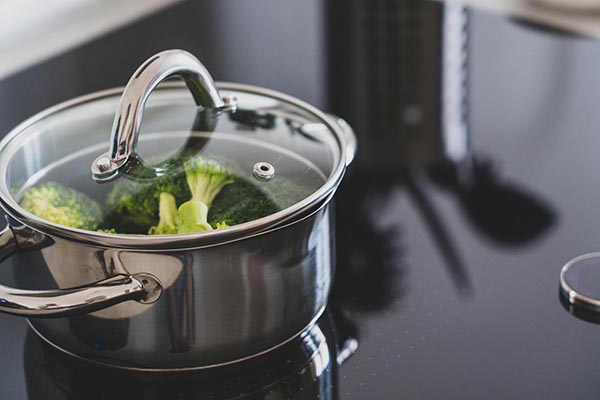Stainless steel cookware in kitchen equipment has excellent corrosion resistance and does not rust easily. As mentioned earlier, it contains chromium. The standard of stainless steel for different materials lies in the Chromium content. In the air, it combines with oxygen to form a solid surface, forming a dense non-oxide film. This non-oxidizing film prevents the surface of the steel from oxidizing and rusting and protects the surface from various corrosive factors. However, if the coating is damaged by corrosion and placed where chromium and oxygen cannot combine, stainless steel kitchenware can also begin to rust.
Why Stainless Steel Kitchen Equipment Rust?
2024-03-08
Stainless steel kitchen equipment itself is a kind of metal that is not easy to rust, but the fact that stainless steel kitchen equipment is not easy to rust does not mean that it will not rust. Depending on the conditions of use or the environment in which it is used, it can also be contaminated and rusted. Especially in the catering industry, the kitchen belongs to an environment of high temperature, high humidity, and high oil. So what exactly causes stainless steel kitchen appliances to rust? And what can we do to avoid this?
What Is Stainless Steel?
Stainless steel is a versatile and widely used alloy known for its corrosion resistance, strength, and durability. It is primarily composed of iron, with at least 10.5% chromium, which forms a protective oxide layer on the surface. This layer prevents rust and other forms of corrosion, making stainless steel an ideal material for commercial kitchen equipment. When running a commercial kitchen, it's crucial to choose the right type of stainless steel. The most common types include austenitic, ferritic, martensitic, and duplex. Austenitic stainless steel, for example, is non-magnetic and offers excellent formability and corrosion resistance, making it perfect for food processing equipment and kitchen utensils.
On top of that, stainless steel is easy to clean, low maintenance and aesthetically pleasing, which makes it popular in complex and changing kitchen environments.

Main Causes of Rust:
● Exposure to Chlorides: Stainless steel can rust if exposed to chlorides, such as those found in salt, bleach, or certain cleaning products. These chlorides can break down the protective layer of chromium oxide on the surface of the steel, leading to rust formation.
● Scratches and Abrasions: Scratches on the surface of stainless steel can provide pathways for moisture and contaminants to penetrate and reach the underlying metal. This can accelerate corrosion and rusting.
● Poor Cleaning Practices: Improper cleaning techniques or the use of harsh chemicals can damage the protective layer of stainless steel, making it more susceptible to corrosion and rust over time.
● Exposure to Acids: Stainless steel can corrode when exposed to strong acids, such as those found in certain foods (e.g., citrus fruits) or cleaning agents. Acidic substances can degrade the protective layer of chromium oxide and promote rust formation.
● High Temperatures: Prolonged exposure to high temperatures, such as during cooking or sterilization processes, can compromise the corrosion resistance of stainless steel, especially if it lacks sufficient chromium content.
Rusting of stainless steel appliances is usually caused by the attachment, accumulation, and attachment of components in floating iron dust or salts from harmful atmospheric gases in the sea breeze. These attachments will gradually build up and become fixed by moisture. This will destroy the non-oxidizing film on the surface of stainless steel kitchen equipment and cookware and prevent the regeneration of the film. As a result, stainless steel kitchenware will begin to rust, but with regular maintenance, the pristine beauty of stainless steel kitchenware can be maintained.

Measures to prevent stainless steel kitchen equipment from rusting:
● Proper Cleaning and Maintenance: Use mild detergents and non-abrasive cleaning tools to clean stainless steel surfaces. Avoid using harsh chemicals or abrasive cleaners that can damage the protective layer. Rinse equipment thoroughly after cleaning to remove any residue.
● Regular Inspection: Periodically inspect stainless steel equipment and cookware for signs of damage, such as scratches or pitting. Promptly repair or replace any damaged items to prevent further corrosion.
● Avoid Exposure to Chlorides: Minimize exposure to chlorides by avoiding contact with salt water, salty foods, or cleaning products containing chlorine. If exposure occurs, rinse the affected surfaces thoroughly with clean water.
● Protective Coatings: Consider applying protective coatings or treatments specifically designed for stainless steel to enhance its corrosion resistance and prevent rust formation. These coatings can provide an additional barrier against environmental factors.
● Avoid Acidic Foods and Cleaners: Be cautious when using acidic foods or cleaning agents on stainless steel surfaces. If necessary, neutralize acidic spills promptly and rinse the area thoroughly with water to prevent corrosion.
Proper Storage: Store stainless steel equipment and cookware in a clean, dry environment to prevent moisture buildup and corrosion. Use appropriate storage racks or shelves to avoid scratches and damage during storage.
● Regular Maintenance Schedule: Implement a regular maintenance schedule for cleaning and inspecting stainless steel equipment and cookware. This helps identify and address any issues before they escalate into larger problems.
By following these preventive measures and maintaining a proactive approach to cleaning and maintenance, you can effectively prevent contamination and rusting in stainless steel kitchen equipment and cookware, ensuring their longevity and performance in commercial kitchen settings.

How to Remove Rust from Stainless Steel Equipment in Your Kitchen
Stainless steel is a primary material in commercial kitchens due to its corrosion resistance. However, this doesn't mean your stainless steel appliances are immune to rust. If you're struggling to remove rust from your kitchen equipment, this guide offers solutions to help you tackle the problem effectively.
Step 1: Gather Your Supplies
•Baking soda
•White vinegar
•Lemon
•Salt
•Soft cloth or sponge
•Non-abrasive scrub pad
•Rubber gloves
Step 2: Assess the Rust
Begin by assessing the extent of the rust. Light surface rust can be treated with milder methods, while deeper rust may require more aggressive techniques. This will help you determine the most effective approach.
Step 3: Baking Soda Method
This method is Ideal for cleaning stainless steel sinks, faucets, and smaller kitchen utensils. The paste can also be used to remove stains from stainless steel surfaces
•Prepare the Paste: Mix baking soda with water to form a thick paste, similar to toothpaste. A common ratio is 1/2 cup of baking soda with enough water to achieve the desired consistency.
•Apply the Paste: Spread the paste over the rusted areas, ensuring full coverage.
•Let It Sit: Allow the paste to sit for 30 minutes to an hour, giving it time to react with the rust.
•Scrub Gently: Use a soft cloth or sponge to scrub the rust gently, following the grain of the steel to avoid scratches.
•Rinse and Dry: Rinse the equipment thoroughly with water and dry it completely with a soft towel.

Step 4: Vinegar and Salt Solution
This solution is effective for cleaning stainless steel appliances, such as refrigerators, ovens, and stovetops. It can also be used for smaller items like pots and pans
•Prepare the Solution: Mix equal parts of white vinegar and water in a container. Add a generous amount of salt and stir until dissolved. For example, use 1 cup of vinegar, 1 cup of water, and 1/4 cup of salt.
•Soak the Equipment: If possible, submerge the rusted equipment in the solution for a few hours or overnight. For larger items, apply the solution with a cloth or sponge and let it sit.
•Scrub the Rust: After soaking, use a non-abrasive scrub pad to scrub away the rust. The vinegar and salt will help to dissolve the rust.
•Rinse and Dry: Rinse the equipment thoroughly with water and dry it completely
Step 5: Lemon and Salt Scrub
This method is suitable for cleaning stainless steel cutlery, small appliances, and even larger surfaces like grills or outdoor equipment. The citric acid in the lemon works well with the abrasive salt to remove rust
•Prepare the Lemon: Cut a lemon in half. There is no strict ratio, but a common approach is to use half a lemon and sprinkle salt on the cut side
•Apply Salt: Sprinkle salt on the cut side of the lemon.
•Scrub the Rust: Use the lemon half to scrub the rusted areas. The citric acid in the lemon helps to dissolve the rust, while the salt acts as a mild abrasive.
•Rinse and Dry: Rinse the equipment with water and dry it thoroughly.
Step 6: Prevent Future Rust
•Dry Thoroughly: Always dry your stainless steel equipment completely after washing to prevent moisture from causing rust.
•Regular Maintenance: Clean and polish your equipment regularly to maintain the protective chromium oxide layer on the surface.
•Avoid Harsh Chemicals: Use mild cleaning agents to avoid damaging the stainless steel
These solutions can effectively address most instances of stainless steel rust in commercial kitchens. They provide a range of options to suit different types of equipment and rust severity. However, if you encounter stubborn rust or are unsure about the best approach for your specific situation, it's always advisable to seek professional assistance.
FAQ
- QWhy does stainless steel cookware rust?Basically, a problem arises when the protective chromium oxide barrier gets severely scratched or corroded, either by metal cookware, harsh detergents, or other elements.
- QHow to remove rust from a stainless steel pan?Dip the cut end of a lemon in table salt. Apply the paste to the rust area with a sponge and gently scrub away the rust, following the grain.
- QWhat type of stainless steel does not rust?All grades of stainless steel resist corrosion, but grade 304 is particularly rustproof because of its high nickel content.
- QWhich stainless steel is best for cooking?For general cooking, Grade 304 stainless steel is best due to its excellent corrosion resistance and durability.
ReviewsNumber of comments: {{ page.total }}
I want to comment?
{{item.nickname ? (item.nickname.slice(0, 2) + '*****') : item.source === 1 ? 'mall buyer' : '--'}}
{{item.comment_time}}
Review in the {{item.country}}
Reviews
Merchant
{{replyItem.nickname ? (replyItem.nickname.slice(0, 2) + '*****') : replyItem.source === 1 ? 'mall buyer' : '--'}}
{{replyItem.parent_nickname ? (replyItem.parent_nickname.slice(0, 2) + '*****') : '--'}}
{{replyItem.is_merchant_reply === 1 ? replyItem.reply_time : replyItem.comment_time}}
Review in the {{replyItem.country}}
Reviews

No customer reviews
recommended for you
no data
Get in touch with us
Related News
no data
Since Shinelong was established in Guangzhou in 2008, we have made great strides in the fields of commercial kitchen planning and kitchen equipment manufacturing.
IF YOU HAVE ANY QUESTION,PLEASE CONTACT US.
WhatsApp: +8618902337180
WeChat: +8618924185248
Telephone: +8618924185248
Fax: +86 20 34709972
Email: info@chinashinelong.com
After-Sales Contact
Telephone: +8618998818517
Email: service@chinashinelong.com
Add: No. 1 Headquarters Center, Tian An Hi-tech Ecological Park, Panyu Avenue, Guangzhou, China.


















